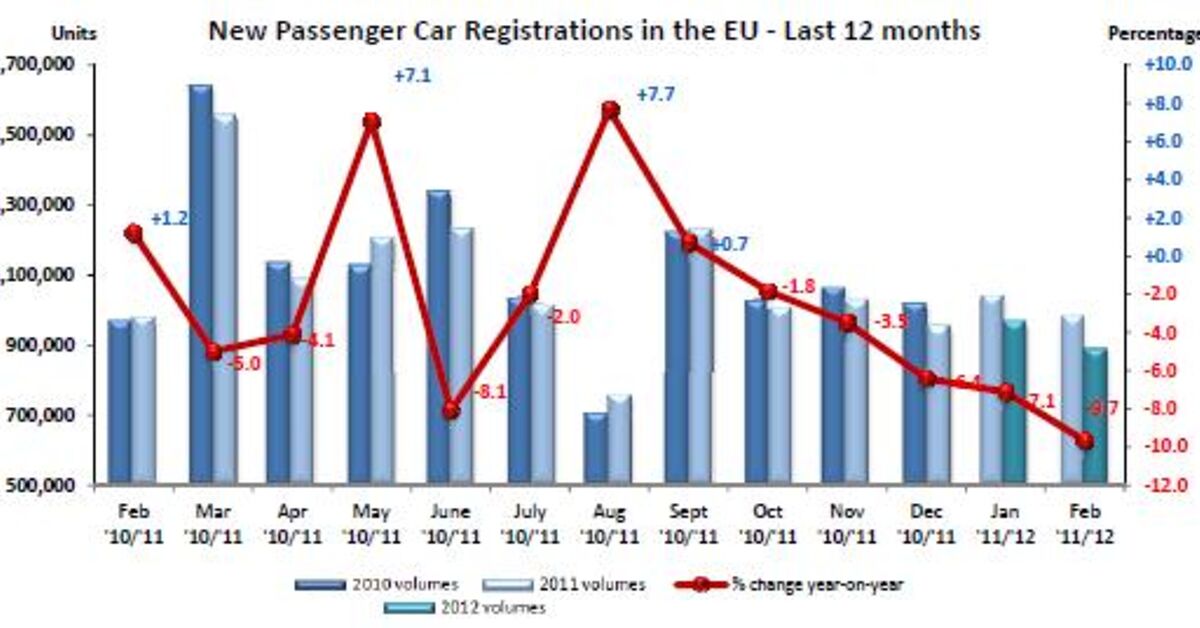Weakening Economy Leads To Drop In European Car Sales Figures

Table of Contents
Economic Slowdown and its Impact on Consumer Spending
The current economic climate in Europe is significantly impacting consumer spending, directly affecting European car sales. High inflation, rising interest rates, and reduced consumer disposable income are key factors contributing to this decline. The cost of living crisis is squeezing household budgets, making large purchases like new cars less accessible.
-
High inflation erodes purchasing power: Soaring inflation rates across Europe mean that consumers' money doesn't go as far. A new car, already a significant expense, becomes even less affordable when prices for everyday goods are also increasing. This price sensitivity is a major driver of the decline in European car sales.
-
Increased interest rates make financing more expensive: Central banks across the continent are raising interest rates to combat inflation. This makes borrowing money more expensive, increasing the monthly payments on car loans and making new car purchases less attractive. Higher interest rates translate directly into reduced affordability for many potential buyers.
-
Uncertainty in the job market leads to reduced consumer confidence: Economic uncertainty often leads to job insecurity, making consumers hesitant to make large, discretionary purchases like new vehicles. This reduced consumer confidence further dampens demand in the European car market.
-
Energy price increases further strain household budgets: The ongoing energy crisis adds another layer of financial strain on European households. Increased energy costs reduce disposable income, leaving less money available for non-essential spending, including new car purchases. This is particularly impactful given the high energy consumption of many vehicles.
Data from Eurostat and other leading economic indicators show a clear correlation between rising inflation, interest rates, and the decline in European car sales figures.
The Impact on Different Car Segments
The decline in European car sales is not uniform across all segments. Different car categories are experiencing varying degrees of impact, reflecting differing price sensitivities and market demands.
-
Luxury car sales likely to be hit hardest: Luxury vehicles are the most susceptible to economic downturns. Their higher price points make them particularly vulnerable to reduced consumer spending and decreased purchasing power. The luxury segment often sees the steepest declines during economic slowdowns.
-
Sales of electric vehicles might show more resilience but still face headwinds: While government incentives often support electric vehicle (EV) sales, the overall economic climate still impacts consumer decisions. Although EVs might show more resilience than traditional combustion engine vehicles, they are not immune to the effects of reduced consumer spending and increased borrowing costs. The high upfront cost of EVs presents a hurdle even with incentives in place.
-
Budget car segment may experience a less severe decline: The demand for affordable transportation remains relatively consistent, even during economic downturns. Budget car segments, offering more economical options, may experience a less severe decline compared to other segments. The resilience of this segment points towards the continuing need for personal transportation, even during times of economic hardship.
Data on sales figures from leading automotive associations like ACEA (European Automobile Manufacturers' Association) further support these observations on segment-specific impacts.
Supply Chain Issues Continue to Play a Role
The ongoing impact of global supply chain disruptions continues to contribute to the lower European car sales figures. These disruptions impact production capabilities and increase costs, compounding the challenges faced by the automotive industry.
-
Semiconductor shortages persist: The global semiconductor shortage continues to hamper the production of vehicles, leading to lower output and longer waiting times for new cars.
-
Logistics bottlenecks increase transportation costs: Disruptions in global supply chains translate to increased transportation costs for raw materials and finished goods, adding to the overall cost of vehicle production.
-
Raw material price increases add to the overall cost of vehicle production: Increased costs for raw materials, such as steel and aluminum, directly impact the final price of vehicles, making them less affordable for consumers.
These supply chain bottlenecks exacerbate the existing challenges posed by the weakening economy, creating a double whammy for the European car market.
Government Policies and Their Influence
Government policies play a significant role in shaping the automotive landscape, influencing European car sales figures. Incentives for electric vehicles and potential tax increases directly impact consumer affordability and market trends.
-
Impact of government incentives on EV sales: Government incentives, such as tax breaks and subsidies, aim to stimulate the adoption of electric vehicles. These policies can mitigate the impact of the economic slowdown on the EV segment, but their effectiveness depends on the generosity and accessibility of these schemes.
-
Analysis of the impact of potential tax increases on consumer affordability: Tax increases on new vehicles, introduced to increase government revenue, can significantly reduce consumer affordability, further depressing sales figures.
-
Discussion of any government interventions aimed at boosting the automotive sector: Governments may intervene with measures designed to support the automotive industry, including financial aid to manufacturers and initiatives aimed at stimulating demand. The impact of these interventions on the European car sales figures varies depending on their nature and scope.
The effectiveness of government policies is a crucial factor to consider when analyzing the ongoing challenges and potential future developments in the European car market.
Future Outlook for European Car Sales
Predicting the future of European car sales is challenging, given the ongoing economic uncertainties. However, by considering various scenarios and potential developments, a reasonable outlook can be formulated.
-
Scenario planning considering different economic growth forecasts: Different economic growth forecasts will lead to varying outcomes for European car sales. A more optimistic economic outlook would likely lead to a gradual recovery in the market, while a pessimistic forecast suggests a continued decline or slow growth.
-
Potential impact of technological advancements on market recovery: Technological advancements, particularly in areas like autonomous driving and connected car technologies, can potentially boost consumer interest and stimulate demand. Innovation within the automotive industry could be a catalyst for market recovery.
-
Discussion on potential strategies for manufacturers to navigate this challenging period: Manufacturers need to adapt their strategies to navigate the current economic challenges. This could involve focusing on more affordable models, strengthening their supply chains, and embracing new technologies to enhance efficiency and appeal to consumers.
The future trajectory of European car sales will depend heavily on a combination of economic recovery, technological innovation, and the strategic responses of the automotive industry.
Conclusion
The significant drop in European car sales figures is undeniably linked to the weakening economy. High inflation, rising interest rates, supply chain disruptions, and reduced consumer confidence have created a challenging environment for the automotive industry. While the future remains uncertain, understanding the interplay of these factors is crucial for navigating this period. Staying informed on the latest trends in European car sales is vital for both consumers and industry players. Continue to monitor the developments in the European car sales market to make informed decisions.

Featured Posts
-
 Erik Ten Hag 10 Key Aspects Of The New Bayer Leverkusen Manager
May 28, 2025
Erik Ten Hag 10 Key Aspects Of The New Bayer Leverkusen Manager
May 28, 2025 -
 Jadwal Penerbangan Saudia Bali Jeddah
May 28, 2025
Jadwal Penerbangan Saudia Bali Jeddah
May 28, 2025 -
 Diamondbacks Vs Dodgers Game Preview And Prediction
May 28, 2025
Diamondbacks Vs Dodgers Game Preview And Prediction
May 28, 2025 -
 Unlikely Encounter Tennis Star Jannik Sinner Meets Pope Leo Xiv
May 28, 2025
Unlikely Encounter Tennis Star Jannik Sinner Meets Pope Leo Xiv
May 28, 2025 -
 Sinners Post Ban Schedule Includes Hamburg Tournament
May 28, 2025
Sinners Post Ban Schedule Includes Hamburg Tournament
May 28, 2025
Latest Posts
-
 Experience The 1 Thriller 2 Hours 10 Minutes That Will Blow You Away
May 29, 2025
Experience The 1 Thriller 2 Hours 10 Minutes That Will Blow You Away
May 29, 2025 -
 On Set Terror The Untold Story Of A Demon Transformation
May 29, 2025
On Set Terror The Untold Story Of A Demon Transformation
May 29, 2025 -
 Bring Her Back Sally Hawkins Stars In A Chilling Resurrection Story
May 29, 2025
Bring Her Back Sally Hawkins Stars In A Chilling Resurrection Story
May 29, 2025 -
 The Shocking Demon Transformation That Terrified Even The Directors
May 29, 2025
The Shocking Demon Transformation That Terrified Even The Directors
May 29, 2025 -
 Otts 1 Thriller 2 Hours 10 Minutes Of Pure Spine Chilling Terror
May 29, 2025
Otts 1 Thriller 2 Hours 10 Minutes Of Pure Spine Chilling Terror
May 29, 2025
